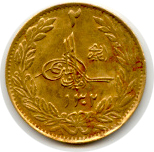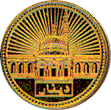By : DATO SERI DR MAHATHIR BIN MOHAMAD
Venue: Sana'a Police Academy - Yemen
Date: 17-06-2001
Title : MAHATHIR URGES MUSLIMS TO STOP BICKERING SANA'A
Aug 16 - Datuk Seri Dr Mahathir Mohamad said today that Muslims must
discard petty quarrels among themselves and strive to acquire the
necessary knowledge to propel Muslim countries on the path towards
development and eventually be at par with developed nations.
The Prime Minister said discord among the community could lead to
Muslim countries becoming weak and thus giving the opportunity to
others to oppress Muslims like what was happening in Palestine.
"I believe quarrelling among ourselves is against the teaching of
Islam. I believe we'll have to work together to become strong," he
said at a meeting and dialogue with members of the Yemeni Shoura Council
at the Sana'a Police Academy here.
The advisory council to the Yemeni government comprises intellectuals,
ulamas and private sector representatives.
Dr Mahathir, who is on his second day of visit to Yemen, said this
was an important strategy for mutual development and to enable Muslims
to defend each other.
In his 40-minute opening remarks, Dr Mahathir said Muslims were not
stupid as proven by their ability in the past to establish proud civilisations
and empires.
Dr Mahathir said: "In Malaysia, we are trying to prove that a Muslim
country can be as developed as other developed countries in the world."
He expressed confidence that if Muslims could join hands, in a few
decades, they too could be as rich as developed nations in the world
and at that stage, no one would dare to oppress Muslims any longer.
"As Muslims, we have a duty to protect each other. But we can't
do that if we are weak and poor," he said.
Dr Mahathir also shared with the more than 200-strong audience how
Malaysia managed to be politically stable and transformed its economy
to become the 17th largest trading country in the world.
He provided an insight on how Kuala Lumpur dealt with the 1997 regional
economic and financial crisis, explained how "Malaysia Incorporated"
worked and what Malaysia was doing to gain from the information technology
era.
He said it was important for Muslim or developing countries not to
miss the information age and that to be rich, a country could not
depend on the agriculture sector alone as it would be better if it
took the path of industrialisation.
Fielding questions from the floor, the prime minister reminded his
audience about the dangers of western-formulated globalisation.
On the subject of Asian currency, he said even the "euro" used in
Europe did not work quite well as it had no intrinsic value.
He explained that a study was being currently undertaken on the possibility
of using the gold dinar for trading.
"If you hold the dinar as reserves and trade is done using the gold
dinar, it's possible to stabilise the value of a currency," he said.
Earlier, Dr Mahathir held a meeting with his Yemeni counterpart Abdul
Kader Ba Jammal followed by an hour-long bilateral delegation meeting
at the Republican Palace here.
After the meeting, two memoranda of understanding were signed, one
on the establishment of the Yemen-Malaysia Joint Commission, and the
other on cooperation and training for civil servants.
Yesterday, Dr Mahahtir and his wife Datin Seri Dr Siti Hasmah Mohamed
Ali were welcomed by the Yemeni Prime Minister and dignitaries on
their arrival at the Sana'a International Airport.
Also present to welcome them were key members of the Malaysian delegation
who arrived in the Yemeni capital earlier.
Dr Mahathir is expected to call on on Yemeni President Ali Abdullah
Salleh at the Presidential Palace before being hosted to a luncheon
by the president.
Later in the afternoon, Dr Mahathir is expected to fly to Aden where
he will visit the Aden port and the Aden Free Trade Zone.
He is scheduled to call on the Governor of Aden, Taha Ahmad Ghanem
before attending a meeting and dialogue session with businessmen and
members of the Yemeni Chambers of Commerce and Industry at the Aden
Hotel.
Dr Mahathir will wrap up the day by gracing a banquet dinner to be
hosted by the governor at the Gold Mohur Sheraton Hotel.
Yemen is located in the southern corner of the Arabian peninsular
and has a population of about 18 million. It began to enjoy relative
political stability only after the unification of North and South
Yemen in 1990, the crushing of a separatist movement in 1994 and the
signing of a border agreement with Saudi Arabia last year.
 THE GOLD DINAR RESEARCH GROUP
THE GOLD DINAR RESEARCH GROUP 